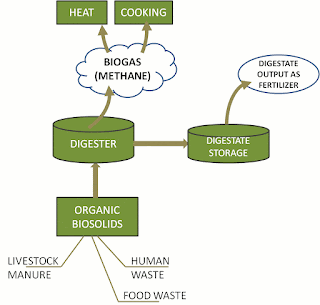In our quest to find methods of
obtaining non-traditional energy (or at least unusual), today we will talk energy
that we get from organic waste (manure, crop residues, etc.). Although it may
seem strange, this system is also used in Southeast Asia and to a lesser extent
in South America. Biogas is a gas composed mainly of methane (CH4) and carbon
dioxide (CO2) from the anaerobic breakdown (without oxygen) of organic matter.
For energy of this waste digesters, which can be industrial or homemade
equipment they are used.
The process is quite simple, the
accumulation of organic waste in an environment without oxygen (digester) makes
the bacteria contained in the transform this waste into biogas, which can be
used to generate heat in a "boiler" or even electricity in large
installations through turbines.
As a byproduct of power
generation in a digester also it would get good quality bio fertilizer, which
makes this system ideal for farms and livestock.
The energy contained in biogas,
should be composed of 65% methane, and would 7kWh / m3, slightly lower than
that of natural gas 10kWh / m3. To get an idea, 1kg of bovine manure would give
0.04 m3 of biogas, thus 280Wh of heat energy. As an example, if we have room of
15m2 for 1h need something more than 5kg of this raw material, in case you want
to take a shower, it would have to 4kg.
It is also possible to produce
biogas from plant debris lesser extent, a ton of corn would produce
approximately 500m3 of biogas, which would give us some energy 3,5kWh.
For transformation of this gas
into heat energy as diesel boilers they are used, although a special burner for
biogas thus would "free" hot water for heating and / or ACS is required.
Before passing the gas boiler and a filtration step removing condensate in
order to prevent corrosion is necessary.
This is just one more example
that it is possible self-sufficient in energy. Although initial investments are
high, in our view energy independence almost always profitable in the long term
though sometimes more comfortable buying energy (gas, electricity, etc.).
